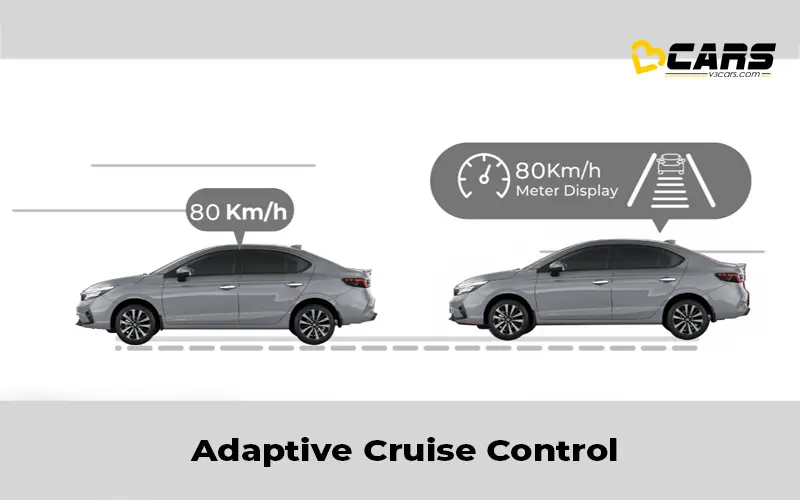What Is Adaptive Cruise Control? Feature Explained
Adaptive Cruise Control (ACC) is an advanced driver-assistance system (ADAS) that is revolutionising highway driving by automating aspects of speed control. But how effective is ACC on the often-chaotic Indian roads? Let’s delve into the details to help you decide if it’s a worthwhile feature for your car.

What Is Adaptive Cruise Control?
Adaptive Cruise Control (ACC) automates speed adjustments to maintain a safe following distance from the car ahead. Here’s how it works:
- Set Your Speed: Choose your desired cruising speed using cruise control buttons.
- Sensor Detection: Radar or camera sensors monitor the distance to the vehicle ahead.
- Automatic Speed Adjustment: ACC reduces your speed if the car ahead slows down and resumes your set speed once a safe distance is re-established.
How Does Adaptive Cruise Control Work?
ACC uses sensors positioned at the front of your car:
- Radar: Emits radio waves to calculate the distance to the vehicle ahead, effective in most weather conditions.
- Camera: Captures real-time footage to identify the leading vehicle, though less effective in low-light or dusty conditions.
The data is processed by the car’s ECU, which takes the following actions:
- Maintain Speed: If the road is clear, ACC keeps your set cruising speed.
- Slow Down: Reduces power or applies brakes to maintain a safe distance.
- Resume Speed: Increases power or disengages brakes once a safe distance is restored.
What Are the Pros & Cons of Adaptive Cruise Control?
The pos or advantages of adaptive cruise control in a car are:
- Reduced Driver Fatigue: Long highway drives can be exhausting. ACC manages your cruising speed, reducing the need for constant pedal adjustments and promoting relaxation.
- Improved Safety: By maintaining a safe distance, ACC helps prevent rear-end collisions, particularly in stop-and-go traffic.
- Enhanced Comfort: ACC provides a smoother driving experience, ideal for long journeys.
The cons or disadvantages of adaptive cruise control are:
- Challenges on Indian Roads: ACC might struggle with sudden lane changes, erratic driving, and large vehicles like trucks or tractors. Drivers must stay alert and ready to take manual control.
- System Dependence: Overreliance on ACC can lead to complacency. Always remain attentive to road conditions.
- Cost Factor: Vehicles equipped with ACC are generally more expensive.
Is Aftermarket Installation Of Adaptive Cruise Control Possible?
Aftermarket installation of ACC is technically possible, but it comes with challenges:
- Compatibility: Not all vehicles are designed to support aftermarket ACC systems, requiring significant modifications.
- Cost: Installing ACC can be expensive, often costing as much as factory-installed systems.
- Reliability: Aftermarket systems may lack the precision and integration of factory-installed systems, impacting performance.
- Warranty Issues: Modifications may void your vehicle’s warranty, so consult your manufacturer before proceeding.
Cars With Adaptive Cruise Control in India
ACC is increasingly available in India, featured in models like the Honda City, Honda Elevate Hyundai Verna, MG Astor, Mahindra XUV700, and Tata Safari.
Cost Of Repairing Adaptive Cruise Control
ACC systems are complex and require delicate calibration. Repair costs can be high, depending on the level of damage. Hence, we recommend you consult your authorised service centers for a repair estimate.
Note: Check your Car EMI with our - Car Loan EMI Calculator
You can use our Fuel Cost Calculator to see how much any petrol, diesel or CNG car will cost to run based on the latest fuel price in your city.



0 Comments
MG Cars in India
Windsor EV
₹14.00 - ₹16.00 lakh*
*Ex-showroom priceComet EV
₹7.00 - ₹9.81 lakh*
*Ex-showroom priceHector
₹14.00 - ₹22.88 lakh*
*Ex-showroom priceHector Plus
₹17.50 - ₹23.67 lakh*
*Ex-showroom priceGloster
₹39.57 - ₹44.74 lakh*
*Ex-showroom priceZS EV
₹18.98 - ₹26.64 lakh*
*Ex-showroom priceAstor
₹11.30 - ₹18.55 lakh*
*Ex-showroom priceUpcoming MG Cars
Cyberster
₹85.00 - ₹99.00 lakh*
*Expected PriceExpected Launch Mar 2025
M9
₹60.00 - ₹70.00 lakh*
*Expected PriceExpected Launch Mar 2025
IM 5
₹25.00 - ₹30.00 lakh*
*Expected PriceExpected Launch Jun 2025
Astor Facelift
₹10.82 - ₹18.73 lakh*
*Expected PriceExpected Launch Sep 2025
S5
₹19.00 - ₹21.00 lakh*
*Expected PriceExpected Launch Oct 2025
IM 6
-
*Expected PriceExpected Launch Oct 2025
Majestor
-
*Expected PriceExpected Launch Nov 2025
eMG6
₹30.00 - ₹40.00 lakh*
*Expected PriceExpected Launch Jan 2027
Marvel R
₹50.00 - ₹60.00 lakh*
*Expected PriceExpected Launch Apr 2027
Euniq 7
₹30.00 - ₹35.00 lakh*
*Expected PriceExpected Launch Jun 2028
MG4
₹20.00 - ₹25.00 lakh*
*Expected PriceExpected Launch Oct 2028
MG5
₹30.00 - ₹35.00 lakh*
*Expected PriceExpected Launch Oct 2028
HS Plug-in
Hybrid
₹20.00 - ₹25.00 lakh*
*Expected PriceExpected Launch Dec 2028
Marvel X
₹50.00 - ₹60.00 lakh*
*Expected PriceExpected Launch Feb 2029
G10
₹24.00 - ₹28.00 lakh*
*Expected PriceExpected Launch May 2029
RC6
₹25.00 - ₹35.00 lakh*
*Expected PriceExpected Launch Dec 2029
iML6
₹45.00 - ₹50.00 lakh*
*Expected PriceExpected Launch Jan 2030
7 Trophy
₹45.00 - ₹40.00 lakh*
*Expected PriceExpected Launch Jan 2030
3
₹10.00 - ₹12.00 lakh*
*Expected PriceExpected Launch Jun 2030
Latest MG Cars Videos
MG Windsor EV Rear Seat & Boot Space Review | Can 3 People Sit In Rear Of Windsor EV?
Hyundai Creta S(O) vs MG Hector Style | Which Car Is More Value For Money?
2024 MG Windsor EV Variants Explained (Excite, Exclusive, Essence) — Which One To Buy?
MG Windsor First Drive Review | This Spacious City EV Is A Mixed Bag
MG Windsor EV Walkaround Review | Rs 10 lakh Price Explained | Interior Space, Battery Warranty
MG Astor Select vs Maruti Suzuki Brezza ZXI+ | Which Car Is More Value For Money?
Long Drive in MG Hector Plus Black Storm Edition Petrol CVT To Jhansi
MG Astor Sprint vs Maruti Brezza VXI | Which Car Is More Value For Money @ Rs 10 Lakh?
MG Astor Sprint vs Tata Nexon Smart Plus S | Which Car Is More Value For Money? | March 2024
MG Astor Sprint vs Maruti Suzuki Grand Vitara Sigma | Which Car Is More Value For Money? | Mar 2024
Astor Important Links